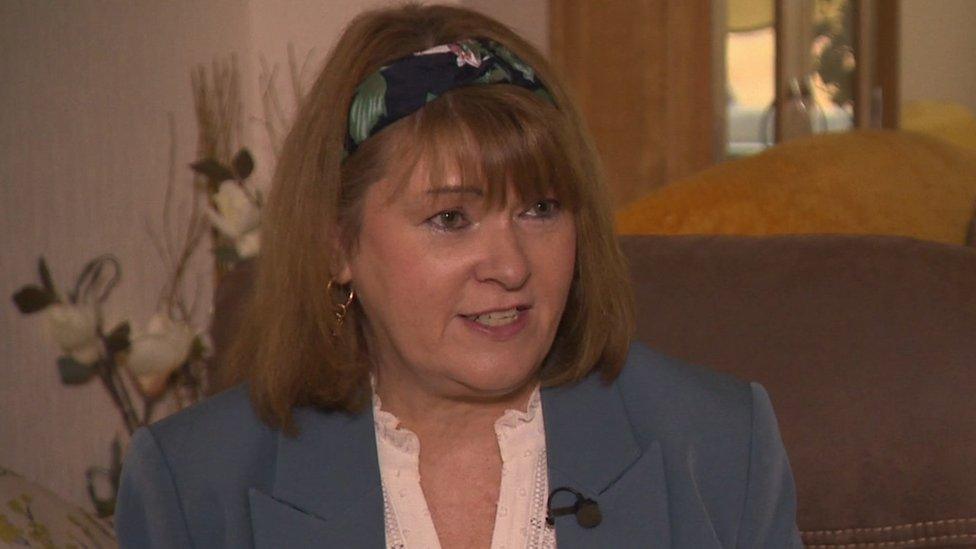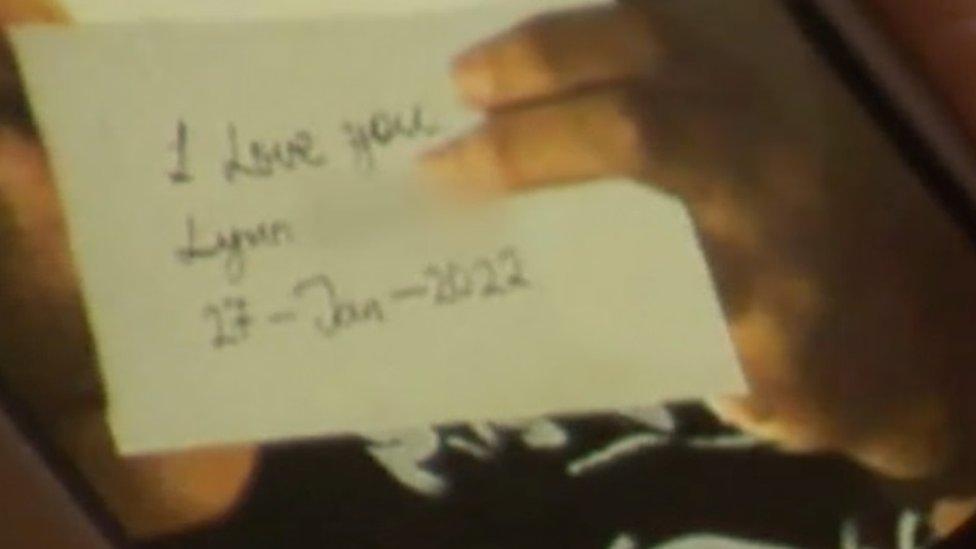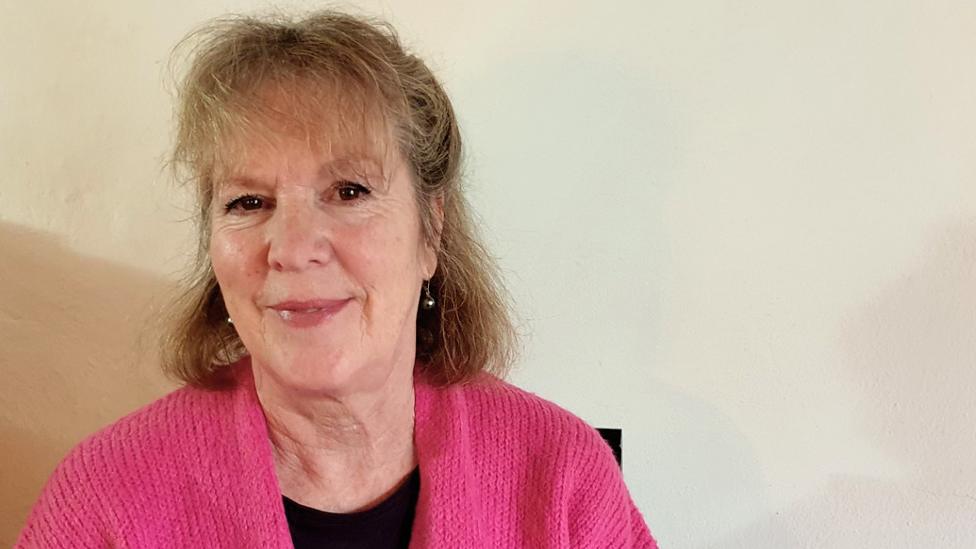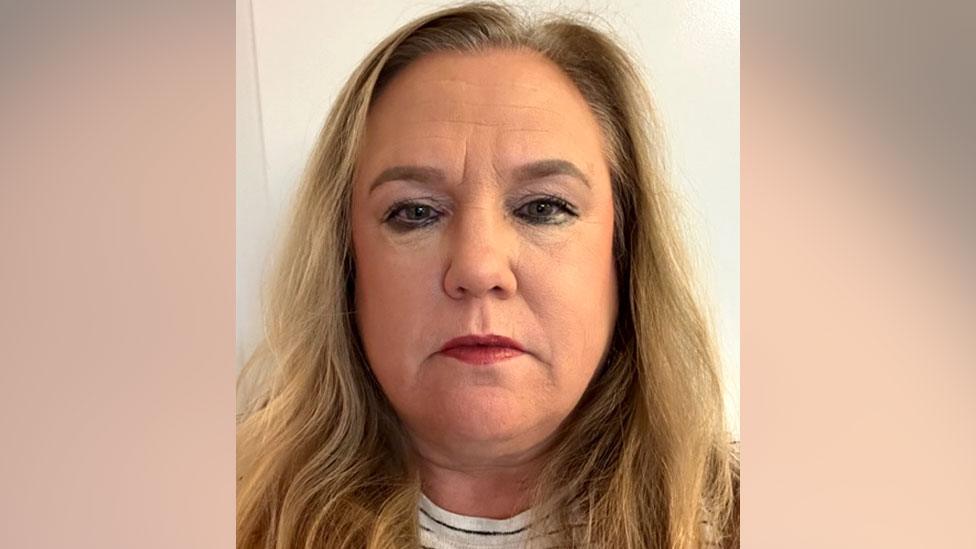Cheshire romance fraud victim speaks out after losing £50k
- Published

Lyn was contacted by 'Derek' through a widows and widowers' social media page
A widow who handed her life savings to an online romance fraudster said she would struggle to "ever trust anybody again" after the £50,000 scam.
Retired mother-of-two Lyn, 60, from Warrington, Cheshire, was taken in by a man she met on a social media page for widows and widowers in May 2021.
'Derek', who claimed he was a Manchester-based businessman, manipulated Lyn before asking for cash.
Lyn said she "felt sick" and "couldn't believe" what had happened to her.
Across England and Wales last year there were 7,660 cases of romance fraud - up from 4,842 in 2019.
All police force areas have seen an increase in the past five years - in the North West, the number of cases has risen by 70%.
Lyn, who lost her husband of 25 years in 2019, said she never suspected any wrongdoing until it was too late.
"When this guy started chatting, he told me about himself," she told the BBC North West Investigation Team. "I thought we've got a lot in common. He said that he'd lost his wife and I thought we're both going through the same sort of experience.
"I checked him out, he said he was from Manchester, supported Man City and I was asking him loads of questions, so I felt really comfortable that he was from the area."
'Derek' told Lyn that he owned a mineral company and regularly travelled between Manchester, Miami and Dubai.

'Derek' told Lyn they would plan a future together
"We had loads of banter over the phone," said Lyn. "We both liked the same things, he said we'll go on holiday and he'll take me back to his place in America."
In June 2021 'Derek' made his first request for cash, telling Lyn he needed £500 as he had an accident in Dubai and his account had been frozen.
"He asked for £500 for medical bills," she said.
"He said he would pay me back with interest, he said 'don't worry about the money' and he just kept reassuring me.
"He sounded so genuine."
The requests for cash kept coming and Lynn's payments to 'Derek' snowballed over that summer.
"I paid over £50,000, which was my retirement money," she said.
"I thought he was truthful, everything about his business tallied up, but then Cheshire Police came knocking at my door."
Officers informed Lynn that 'Derek' did not exist and the person behind the account was part of a romance fraud gang.
Your device may not support this visualisation
"I felt sick, I was numb. I didn't believe it at first, I thought this isn't real," she said.
The magnitude of the crime hit Lynn soon afterwards,
She said: "I thought, how am I going to manage now? That money was for my retirement."
Lyn, who eventually got her money back with the help of her bank, wants people to be vigilant.
"My message to people - don't keep anything to yourself, if you feel something's wrong, talk to family or friends. Don't bottle it up.
"You might not want to hear what they say, but your friends and family have known you all your life, so you know they're looking out for you... not the person who's robbing you."
Cheshire Police said efforts to identify 'Derek' were ongoing.

Mr Ainsley said the break the spell team stopped customers handing over £5.2million to scammers last year
The force said Lyn was by no means alone.
Romance scams have cost people in the North West an estimated £36m over the last five years.
It's a crime that Santander's "break the spell" team based in Bootle, Merseyside, are all too familiar with.
Head of Fraud Chris Ainsley said: "The romance scams often are the ones that take the longest for us to break the spell on.
"They're the ones that potentially have the most emotional damage to a customer.
"If you're buying a pair of trainers that don't turn up after a few weeks you know what's happened.
"If you think you're in a relationship with someone who's asking for money - maybe over a year or longer - to the point where you've taken out loans to pay for that, then that's the most difficult for us to deal with."
Cieran McNamara, 37, was jailed for seven years at Chester Crown Court last month after he manipulated four women out of £300,000.
He tricked his victims into believing they were in a loving relationship before faking a crisis to manipulate them into sending large sums of money.

Cieran McNamara posed as a wealthy property owner to trick his victims
McNamara, who was also known as Ciaran Griffin, Christian McNamara and Myles McNamara met the women through a variety of methods including online and in exclusive hotels and clubs.
He swindled them into believing he had a high-value property portfolio by showing them pictures of himself at mansions in London and Cheshire.
A woman who briefly dated McNamara said he told her he had gone to Eton College with Prince William and had trained to be a barrister at university before taking over his late mother's property business.
The woman, who did not want to be named, told the BBC: "He said he wanted to carry on the legacy of his mum's business and boasted he had properties in Manchester and all over the UK.
"We had a few dates where he flashed the cash at expensive restaurants but I knew something wasn't right with him.
"He started sending me pins of locations I was at which unnerved me. I felt like I wasn't safe."
The woman managed to escape his clutches without handing over any money when she found out he was wanted for romance fraud on a Cheshire Police Facebook page.
She said: "I started feeling a lot of guilt because obviously those dates that he'd taken me on had probably been funded by the women he defrauded."

How to stay safe from romance scams:
Be suspicious of any requests for money from someone you have never met in person, particularly if you have only recently met online
Ask for advice from family or friends
Profile photos may not be genuine - do your research first. Performing a reverse image search on a search engine can find photos that have been taken from somewhere - or someone - else.
Source: ActionFraud
Further support can be found via BBC Action Line.

Why not follow BBC Manchester on Facebook, external, X, external and Instagram, external? You can also send story ideas to northwest.newsonline@bbc.co.uk, external
- Published14 February 2024

- Published16 September 2023
